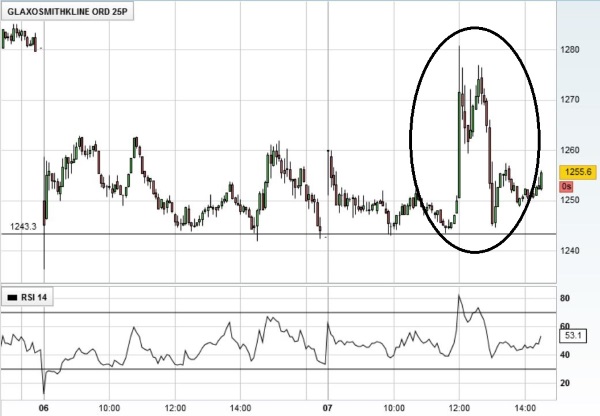GlaxoSmithKline share price spike explained
7th February 2018 14:29
by Graeme Evans from interactive investor
Share on
At the start of what promises to be a critical year, and its chief executive Emma Walmsley reassured investors today with a better-than-expected performance over the final three months of 2017.
But the resulting full-year 4% growth in adjusted earnings per share (EPS) and £30 billion of revenues shouldn't gloss over the company's challenges as it comes to terms with generic competition facing its respiratory business in particular.
Replenishing the drugs pipeline with new blockbuster products is an absolute priority, with Walmsley set to give an update on progress during the second quarter of 2018. She has set the tone by increasing research and development spending by 23% to £4.5 billion during 2017, while also hiring some high-profile names including former Roche chief medical officer Hal Barron.
The company has been boosted by regulatory approval for three new products, including shingles vaccine Shingrix and its once-daily inhaler for lung disease.
But the harsh reality is that if generic versions of its Advair inhaler reach the US market as expected this year, its adjusted EPS for 2018 will be flat to down 3%. Without competition, the figure could be between 4% and 7% higher.

But it's not just drugs uncertainty that is troubling shareholders. There's the ongoing speculation that Walmsley wants to pitch Glaxo against and other multinational companies in a battle for Pfizer's £12 billion-rated consumer healthcare division.
This has left investors fearful that a deal could jeopardise Glaxo's attractive dividend, which currently yields around 6%. Strong free cash flow of £3.4 billion meant the company today delivered on the dividend expectations set out in the second quarter, with 80p a share declared for 2017 and the same figure still expected for this year.
Consumer healthcare is highly cash generative, but in the eyes of investors this is outweighed by uncertainty over a potential bidding war. That's a major reason why the Glaxo share price has slid towards a five-year low in recent weeks.
Shares in Glaxo are down more than 20% since Walmsley's appointment, which has allowed UK pharmaceuticals rival to close the gap. At £61 billion, Glaxo's market cap is now only marginally ahead of Astra's.
The addition of the consumer healthcare division would certainly play to Walmsley's strengths, as she was the former boss of GSK's Sensodyne and Panadol division before taking the top job from Andrew Witty in April last year.
Witty's closing months as CEO were spent responding to pressure from shareholders including fund manager Neil Woodford about a break-up of the business. Woodford argued unsuccessfully that the sum of the parts was significantly greater than the whole.
These articles are provided for information purposes only. Occasionally, an opinion about whether to buy or sell a specific investment may be provided by third parties. The content is not intended to be a personal recommendation, and is not provided based on an assessment of your investing knowledge and experience, your financial situation or your investment objectives. The value of your investments, and the income derived from them, may go down as well as up. You may not get back all the money that you invest. The investments referred to in this article may not be suitable for all investors, and if in doubt, an investor should seek advice from a qualified investment adviser.